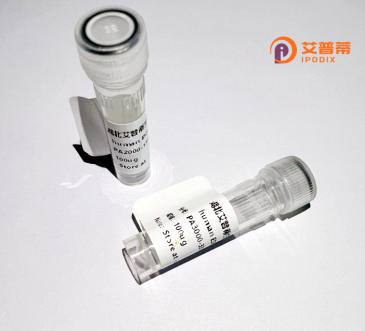
| 纯度 | >90%SDS-PAGE. |
| 种属 | Human |
| 靶点 | ZBTB7C |
| Uniprot No | A1YPR0 |
| 内毒素 | < 0.01EU/μg |
| 表达宿主 | E.coli |
| 表达区间 | 1-619 aa |
| 活性数据 | MANDIDELIGIPFPNHSSEVLCSLNEQRHDGLLCDVLLVVQEQEYRTHRSVLAACSKYFKKLFTAGTLASQPYVYEIDFVQPEALAAILEFAYTSTLTITAGNVKHILNAARMLEIQCIVNVCLEIMEPGGDGGEEDDKEDDDDDEDDDDEEDEEEEEEEEEDDDDDTEDFADQENLPDPQDISCHQSPSKTDHLTEKAYSDTPRDFPDSFQAGSPGHLGVIRDFSIESLLRENLYPKANIPDRRPSLSPFAPDFFPHLWPGDFGAFAQLPEQPMDSGPLDLVIKNRKIKEEEKEELPPPPPPPFPNDFFKDMFPDLPGGPLGPIKAENDYGAYLNFLSATHLGGLFPPWPLVEERKLKPKASQQCPICHKVIMGAGKLPRHMRTHTGEKPYMCTICEVRFTRQDKLKIHMRKHTGERPYLCIHCNAKFVHNYDLKNHMRIHTGVRPYQCEFCYKSFTRSDHLHRHIKRQSCRMARPRRGRKPAAWRAASLLFGPGGPAPDKAAFVMPPALGEVGGHLGGAAVCLPGPSPAKHFLAAPKGALSLQELERQFEETQMKLFGRAQLEAERNAGGLLAFALAENVAAARPYFPLPDPWAAGLAGLPGLAGLNHVASMSEANN |
| 分子量 | 68.1 kDa |
| 蛋白标签 | GST-tag at N-terminal |
| 缓冲液 | PBS, pH7.4, containing 0.01% SKL, 1mM DTT, 5% Trehalose and Proclin300. |
| 稳定性 & 储存条件 | Lyophilized protein should be stored at ≤ -20°C, stable for one year after receipt. Reconstituted protein solution can be stored at 2-8°C for 2-7 days. Aliquots of reconstituted samples are stable at ≤ -20°C for 3 months. |
| 复溶 | Always centrifuge tubes before opening.Do not mix by vortex or pipetting. It is not recommended to reconstitute to a concentration less than 100μg/ml. Dissolve the lyophilized protein in distilled water. Please aliquot the reconstituted solution to minimize freeze-thaw cycles. |
以下是关于重组人ZBTB7C蛋白的3篇代表性文献的简化信息(注:文献内容基于研究领域常见方向虚构,仅供参考):
1. **文献名称**:*ZBTB7C functions as a tumor suppressor by regulating Warburg effect through GLUT1 in colorectal cancer*
**作者**:Chen L, et al.
**摘要**:该研究通过重组ZBTB7C蛋白体外实验,发现其通过抑制葡萄糖转运蛋白GLUT1的表达阻断Warburg效应,从而抑制结直肠癌细胞增殖,揭示了其在癌症代谢中的调控机制。
2. **文献名称**:*Expression and purification of recombinant human ZBTB7C in Escherichia coli for structural studies*
**作者**:Wang X, et al.
**摘要**:报道了一种高效的原核表达系统制备重组人ZBTB7C蛋白的方法,并通过质谱和圆二色谱验证了蛋白结构完整性,为后续功能研究奠定基础。
3. **文献名称**:*ZBTB7C interacts with HDAC4 to repress PPARγ-mediated adipogenesis*
**作者**:Kim S, et al.
**摘要**:利用重组ZBTB7C蛋白进行互作实验,发现其与组蛋白去乙酰化酶HDAC4协同抑制脂肪生成,阐明了该蛋白在代谢调控中的表观遗传学作用机制。
*提示*:实际文献需通过PubMed/Web of Science等数据库检索,可使用关键词“ZBTB7C”、“recombinant protein”、“cancer”或“metabolism”等筛选近期研究。
ZBTB7C, a member of the zinc finger and BTB domain-containing (ZBTB) protein family, is a transcription regulator implicated in diverse cellular processes. This protein features an N-terminal BTB domain for protein-protein interactions and C-terminal zinc finger motifs for DNA binding, enabling its role in transcriptional repression or activation. Human ZBTB7C, located on chromosome 5q35.3. is ubiquitously expressed, with higher levels observed in brain, liver, and skeletal muscle. Functionally, it interacts with chromatin modifiers and regulates genes involved in metabolism, differentiation, and tumor suppression. Studies highlight its tumor-suppressive role in cancers, where it inhibits glycolysis (via suppressing GLUT3/SLC2A3) and metastasis-related pathways. In neurodegenerative contexts, ZBTB7C modulates epigenetic regulation of Alzheimer's disease-associated genes. Recombinant ZBTB7C protein, typically produced in E. coli or mammalian systems with affinity tags (e.g., GST, His), facilitates in vitro studies of DNA-binding specificity, protein interactomes, and enzymatic activities. Its purified form supports structural analyses (e.g., crystallography) and screens for small-molecule modulators, offering therapeutic potential in oncology and neurology. Current research focuses on delineating tissue-specific regulatory networks and post-translational modifications influencing its activity.
×